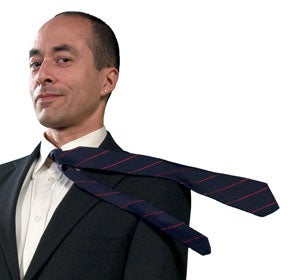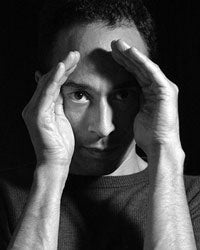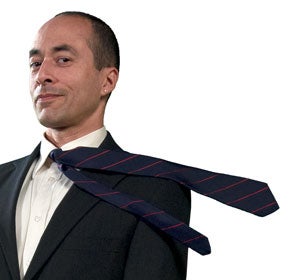 KINGSTON, R.I., Sept. 10, 2015 – How should Americans describe themselves? Black? White? Hispanic? Asian? Native American? Biracial? Teja Arboleda has a better idea: How about if we just call everyone “human.”
KINGSTON, R.I., Sept. 10, 2015 – How should Americans describe themselves? Black? White? Hispanic? Asian? Native American? Biracial? Teja Arboleda has a better idea: How about if we just call everyone “human.”
Arboleda tours the country challenging audiences to rethink what it means to be an American, and now he’s bringing those ideas to the University of Rhode Island for the annual Honors Colloquium.
His talk will start at 7 p.m. in Edwards Auditorium, 64 Upper College Road on the Kingston campus. The event is free and open to the public and will be followed by the show, “You’ve Crossed the Line,” in which Arboleda and his team explore freedom of speech, equality and diversity through stand-up comedy.
Arboleda, who lives in Massachusetts, is a nationally acclaimed expert on race and cultural diversity who uses his background – and humor – to talk about racial stereotypes, often reinforced by the media and those in power.
He is a living example of diversity. His father is African-American, Native American and Filipino-Chinese and his mother is German-Danish. Although born in Brooklyn, he lived in Germany for two years and grew up in Japan. He came to the United States when he was 19 years old to study.
 As the founder of Entertaining Diversity, Inc., Arboleda provides consulting and education programs, through entertainment, about multiculturalism to schools, companies and civic groups. He is also the author of the memoir, “In the Shadow of Race,” and he teaches communication and sociology at Clark University.
As the founder of Entertaining Diversity, Inc., Arboleda provides consulting and education programs, through entertainment, about multiculturalism to schools, companies and civic groups. He is also the author of the memoir, “In the Shadow of Race,” and he teaches communication and sociology at Clark University.
URI chatted with him recently about his talk, racial barriers, the importance of multiculturalism and more.
What do you plan to talk about at URI?
Coffee. And that’s because there are so many choices. For example, I’m a hot, tall mocha. And race. And that’s because there are so many choices. But that’s really the point – how you identify yourself is a personal choice. The United States is changing faster than a barista can conjure up another green tea latté, and college students today, for the most part, live in a very different world – a world that is inclusive, outspoken, diverse, but often confined by old thinking, boxes and cultural hierarchies.
Your performance, “You’ve Crossed the Line,” is a unique way to talk about diversity. What we can expect?
Very safe, very funny, very edgy, very honest. Expect to be on the edge of your seat wondering if it’s okay to laugh. Then when you do, you will have a moment of ‘oh no’, and then, ‘oh yeah’. The audience will have remote clickers so they can vote on whether or not the comedians crossed the line. And the judges are four faculty from your campus! Afterwards there is a discussion about language, freedom of speech, race, culture, gender, class, religion, LGBT identity and who gets to say what.
I read that a man in a grocery store once told you to “take your pita bread and hummus and go back to Mexico” and that your landlady would only allow you to put your rent check under her door. How did these awful experiences shape you?
It’s true. So I took my pita bread and humus and moved to Mexico and settled down with a nice woman who left me after I tried to convince her that hummus was Mexican. After I escaped back into the United States, I rented an apartment near Boston, where the landlady refused to speak to me or my roommate in person because I was a person of color, and my roommate was Jewish. But truthfully, bad experiences help shape our tolerance for ignorance and aggression.
You say “race is a four-letter word.” What do you mean by that?
Well, it actually is a four-letter word. Also, it often lies on the tip of our tongues, as a filthy intention might, with adrenalin running, arms folded, defensive as we often get when talking about it. Not a day goes by that I read another story about attacks on people of color in this country, and most places in the world. Racial classifications are completely fabricated, and yet we continue to tear a chasm between people based on physical attributes.
What role does humor play in getting people to talk openly about the very serious topic of race?
In 1991, I went to see Saturday Night Live comedian/producer/writer Al Franken, now Senator from Minnesota, talk at Harvard University’s Kennedy School of Government. He talked about comedy and politics, but then said some very racist, sexist things. I got on the mic and challenged him. He then called me, That Ethnic Guy – hence my stage name, Ethnic Man! Humor is important because it helps break down the barriers and opens things up, just enough to make us question our own intentions and beliefs. Besides, I don’t want to walk around brooding over Donald Trump’s latest comments; rather, laugh at the ignorance that feeds the intentions of people who try to make life miserable for others.
Why do you think some people are frightened by men and women who look different from them?
Yes. I’m frightened by angry people with really bad hairdos. But babies are not born prejudice, no matter what ‘experts’ say. Color, size, accents, orientation, all that – that’s just interesting and beautiful. We are taught to be afraid.
You’ve said that one way to eliminate racism is to eliminate racial categories. Do you think racial categories will simply vanish in this country one day?
Sure. But no, it won’t simply vanish. Most industrialized countries have eliminated racial categories, as we practice them today in the United States. The question is why does the Census Bureau and The Office of Management and Budget continue to issue and change categories? Because they actually don’t have a consensus. They don’t know what to do.
How important is multiculturalism on college campuses?
Vital, vital, vital. A diverse workforce and society is healthy and advantageous. It’s like yogurt. Billions of really good bacteria are essential for your digestion. Especially when you drink as many mocha lattés as I do. Diversity should be a component in most college course curricula. I know this because I’m a college professor, and I’ve performed and spoken at over 1,000 colleges in the United States, Canada and Japan.
What can college students do to embrace our increasingly diverse culture?
Embrace each other.
The major sponsor of this year’s Honors Colloquium is the URI Honors Program.
Other URI sponsors are Office of the President; Office of the Provost; The Mark and Donna Ross Honors Colloquium Humanities Endowment; The Thomas Silvia and Shannon Chandley Honors Colloquium Endowment; College of Arts and Sciences; College of Pharmacy; The Harrington School of Communication and Media; John Hazen White, Sr. Center for Ethics and Public Service; Gender and Women Studies Program; Theatre Department; Talent Development Program; College of Engineering; College of the Environment and Life Sciences; College of Human Science and Services; College of Business Administration; College of Nursing; Division of Student Affairs; Department of Marketing and Communications; Department of Publications and Creative Service; Instructional Technology and Media Services; ASF College of Continuing Education, URI Providence; and URI Family Weekend 2015.
This year’s organizers of the colloquium are Rachel DiCiccio, professor of communication studies, and Brian Quilliam, associate dean and professor of pharmacy. For more information on colloquium events contact Deborah Gardiner at 401-874-2381 or debg@uri.edu.
For information about ways to support the Honors Colloquium, contact Lynne Derbyshire, URI professor of communication studies and Honors Program director, at 401-874-4732. If you have a disability and need an accommodation, please call 401-874-2303 at least three business days in advance.
For TTY assistance, please call the R.I. Relay Service at 800-745-5555.
For more details about the events, visit Honors Colloquium.
Pictured above: Teja Arboleda, a writer, comedian and actor who is speaking at the University of Rhode Island Oct. 6 for the annual Honors Colloquium. Photos courtesy of Teja Arboleda.

